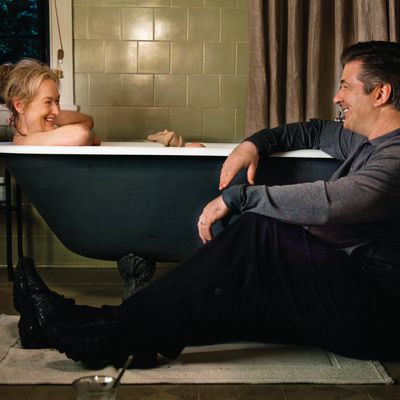
Each week on It’s Complicated, we’ll be drawing you a warm bath in which to soak up the linguistics of romance.
It’s complicated. It’s the name of this very pop-up blog about relationships. But we would be loath to try to suggest that you’re not already intimately familiar with the phrase, or that we have any more or less of a claim to it than anyone else. After all, Facebook made it a standard option on the drop-down menu of relationship descriptors some ten years ago, allowing daters and would-be daters and whoever else might be interested to take note of such inherent drama in their friends’ profiles and, at the very least, to be warned before engaging or getting engaged. So even though Facebook didn’t create it’s complicated, it gets a lot of the credit for spurring its use across the world wide web and beyond.
In 2009 came It’s Complicated, the Nancy Meyers rom-com starring Alec Baldwin and Meryl Streep: He’s the ex-husband with whom, ten years after their divorce, Meryl’s character — who has the best kitchen in the history of cinematic kitchens — embarks on a secret affair while also experiencing the growing hots for her architect, Adam. It’s complicated! But she makes the best chocolate croissants. And if Alec Baldwin is in your movie called It’s Complicated, you can be sure it’s complicated is a bona-fide household expression, even if it’s one that indicates a broken-ish home.
But at least a century before Alec and Meryl explored the world of post-divorce hanky-panky, it’s complicated and even simply complicated were being used to describe exactly the sort of situations you’d imagine, explains Merriam-Webster lexicographer Kory Stamper. With a brief break in the Reagan years when it’s complicated was used “to describe just about every foreign interaction the administration had,” the phrase has been a consistent go-to for describing romantic conundrums, especially love triangles and fraught relationships. “The stand-alone, relationship-related it’s complicated goes back to at least the late 1800s,” Stamper says. “In Henry James’s The Tragic Muse, one character tries to untangle a lover’s knot of intention and desire for someone else by saying, ‘Oh Peter, it’s awfully complicated.’” And in 1915’s Of Human Bondage, W. Somerset Maugham uses complicated to refer to relationships and their many variations (and participants): “When he had to choose between his wife and his mistress he chose his wife. He had been always anxious that there should be no child to make the entanglement more complicated.”
Over the years, “it’s complicated continued to show up, primarily in transcribed or fictional speech, and often in serial romances,” says Stamper. Usually relatively informal, it’s appeared “more and more in running text that wasn’t transcribed, or in fictional speech: A 1976 Newsweek article on a poll by the women’s magazine Marie Claire notes that 42 percent of French women said that juggling a spouse and a lover was ‘complicated,’ wording chosen by the pollsters.”
Why do we so love the word complicated when it comes to relationships of love embedded with, maybe, a dash of hate? Perhaps it’s because it’s a temporary hedge, a way in which we may have our cake and eat it too, a method of explaining our status without revealing so much that things are no longer open enough to be free-flowing and possible. After all, it’s complicated isn’t a no. It isn’t a yes, either. It’s a pithy two-word expression, but enough that people can nod and get the gist, if not the specifics. It’s the “more than meets the eye” of statements, akin to the glimpse of just the tiniest bit of forbidden skin on a would-be romantic partner. It’s mysterious, juicy, and a little bit magnetic, and if you prefer bad boys or girls, maybe even enticing. It’s complicated may be complicated (it owns up to it right off the bat, so can you blame it?), but it’s never boring.
My favorite use of the phrase appears in a 1919 newspaper clipping, titled “Cills Now Faces Marital Tangle, He’s a Muchly Married Actor Man,” published in the Oakland Tribune. The story involves a Mr. Norbert Maynard Cills and a Miss Sunshine Plompteaux, to whom Cills has been wed not once, but twice (“once according to the Buddhist religion and once according to American custom”). Unfortunately, given the presence of “Mrs. Maisia Gladys Cills-Walton, who says that she is still [Cills’s] wife, though she doesn’t want to be” … well, explains the reporter, “it’s complicated.”
Indeed, it still is.




